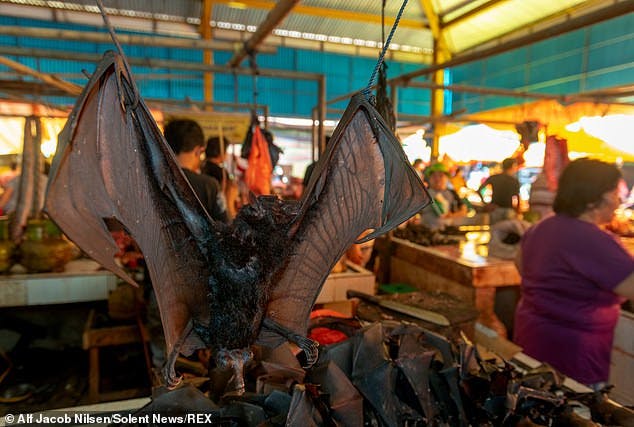Shocking picture of bats for sale in Indonesia

When will wet markets be banned across the globe? As this photo from Indonesia shows, it's not just China. EVGENY LEBEDEV issues a call for action
Since I have begun to write on the urgent need to close live animal markets, I have been surprised by the support I have received from across the UK.
Readers of The Mail on Sunday have written to say how strongly they agree about the threat of contagion they pose, and to offer ideas on how we can bring about an absolute crackdown on this vile trade.
Others simply expressed disbelief. 'For goodness sake,' wrote one woman in an email, 'what pandemic are they going to give the world next?'
The bats of Tomohon market are Indonesia's worst-kept secret, but the photograph revealed on this page still has the power to shock.
The local 'it can't happen here' complacency with regard to a viral disease is dangerously misplaced.
Bats are carriers of all sorts of viruses and pathogens. There are even reports that local authorities found another strain of coronavirus in the bats of Tomohon in 2018.
As we all know, it is likely that Covid-19 emerged from a bat in the Wuhan 'seafood' market. How much more warning did we need?
The coronavirus that has laid waste to the world economy and led to almost 200,000 recorded deaths was most probably the result of poor hygiene at an illegal wildlife market. Its aftershocks will be felt for years to come.
That is what makes the photo here of a filthy market with animal carcasses stacked together all the more horrifying.
Experts predict that humanity's ever-growing encroachment and exploitation of the natural world has made zoonotic diseases four times as frequent in the past 50 years.
Many have called the last few months an aberration, yet the truth is that we risk this becoming the new normal. The Independent, which I partly own, shares this concern and has launched a campaign to ban the illegal wildlife trade wherever it may be found.
We are working with wildlife charities such as Space For Giants and other organisations to inform the public and pressure governments where necessary.
It is quite simply astounding that even while the world grapples with the fallout of this deadly pandemic, these markets can remain open in Indonesia and across China and South East Asia, according to reports.
Before, this was an animal rights problem and a matter for international wildlife experts.
Now it is a global health crisis and a threat to us all. The world failed to act following the SARS outbreak in 2002, which also came from a wildlife market. We cannot make the same mistake again.
The voices behind this campaign grow ever louder. I am calling for urgent international action on wildlife wet markets. The Australian government agrees, and on Thursday called for multilateral action, citing the markets as a 'biosecurity and human health risk'.
Given the evident support among the public, including readers of The Mail on Sunday, for such measures, the British Government should follow suit.
It is only through international co-operation and the enforcement of existing bans that this threat can be defeated. After this pandemic, we have an opportunity to recast our relations with the animal world. Or, we can sit back and wait for the next outbreak.

